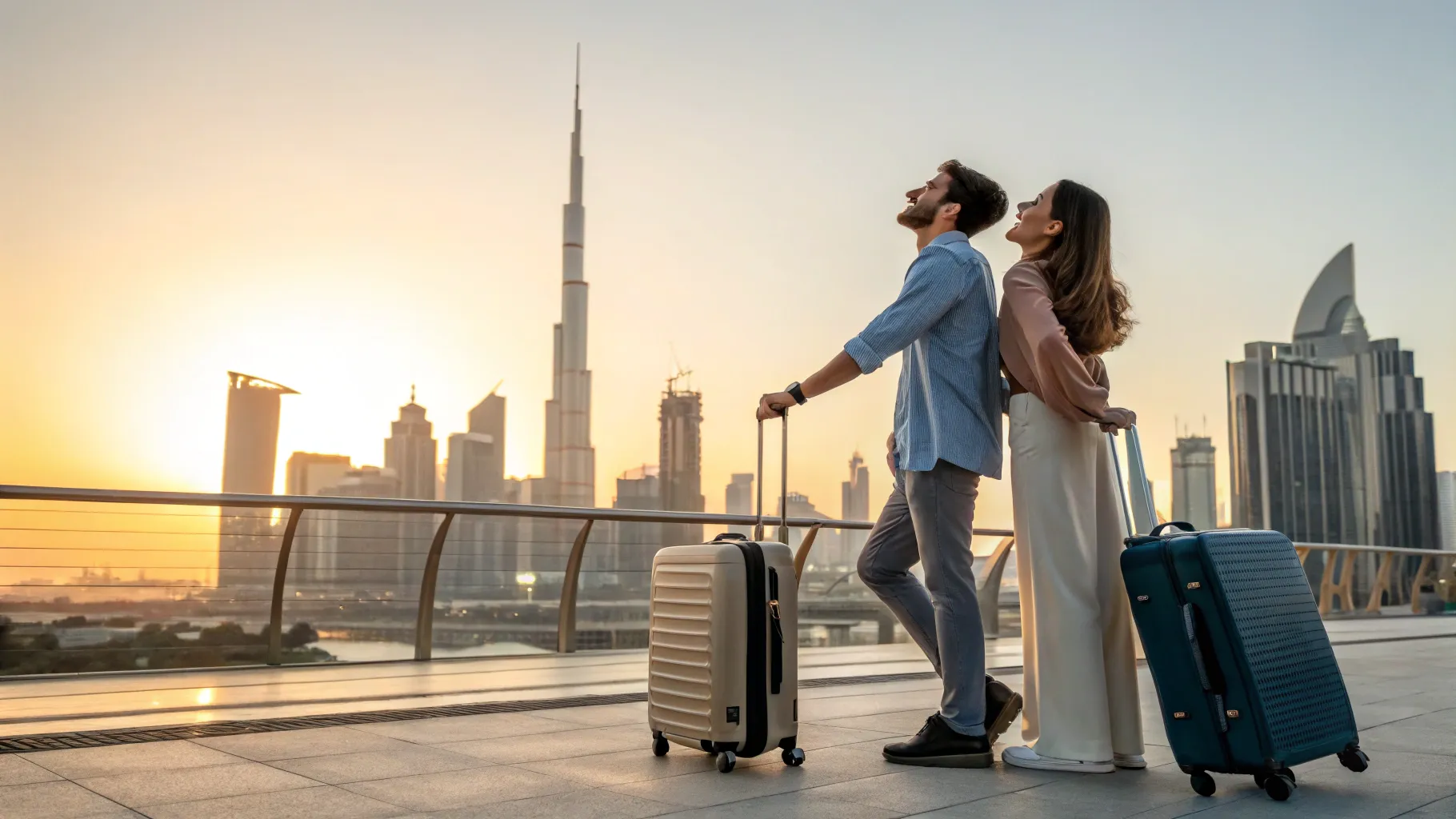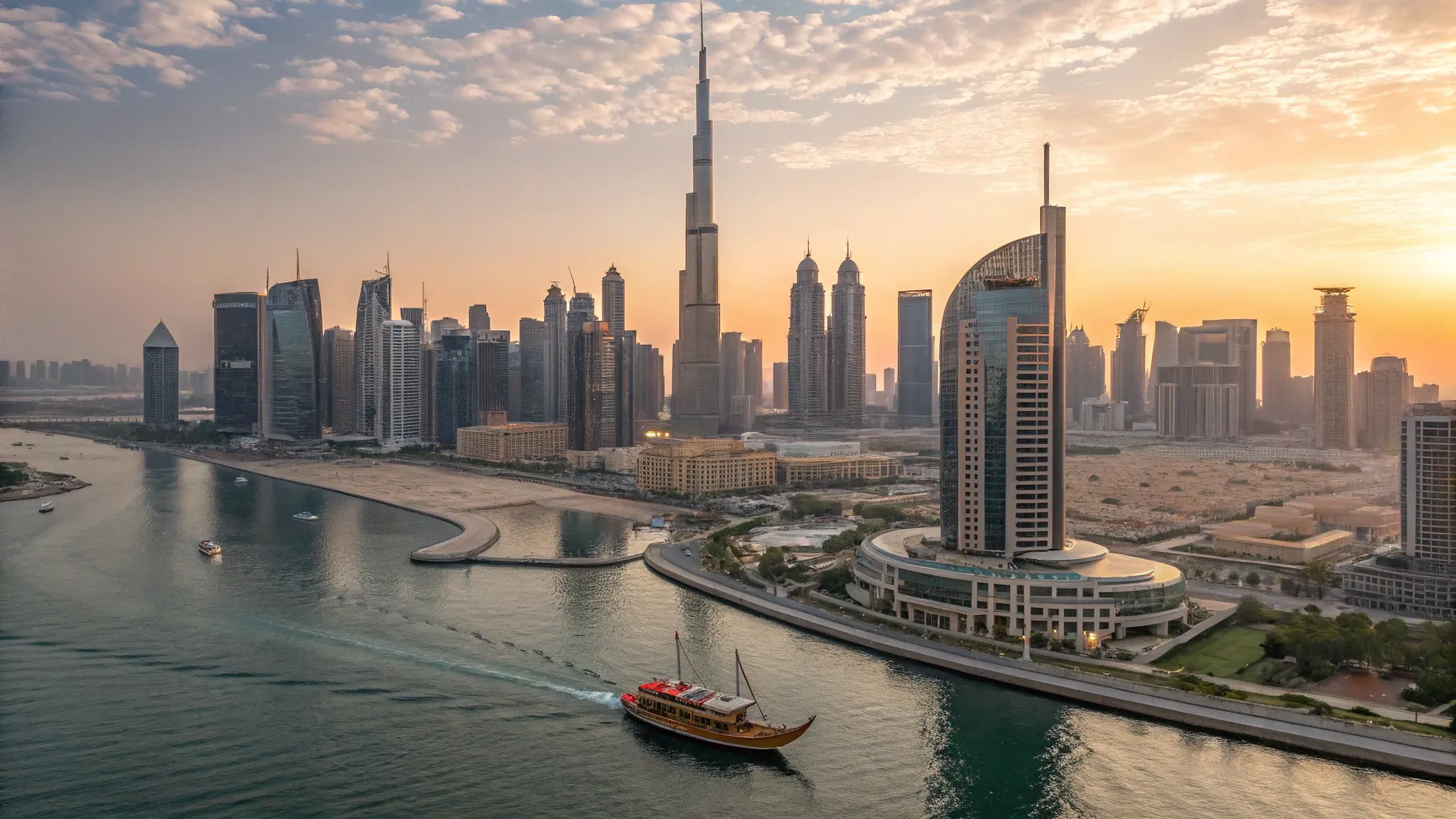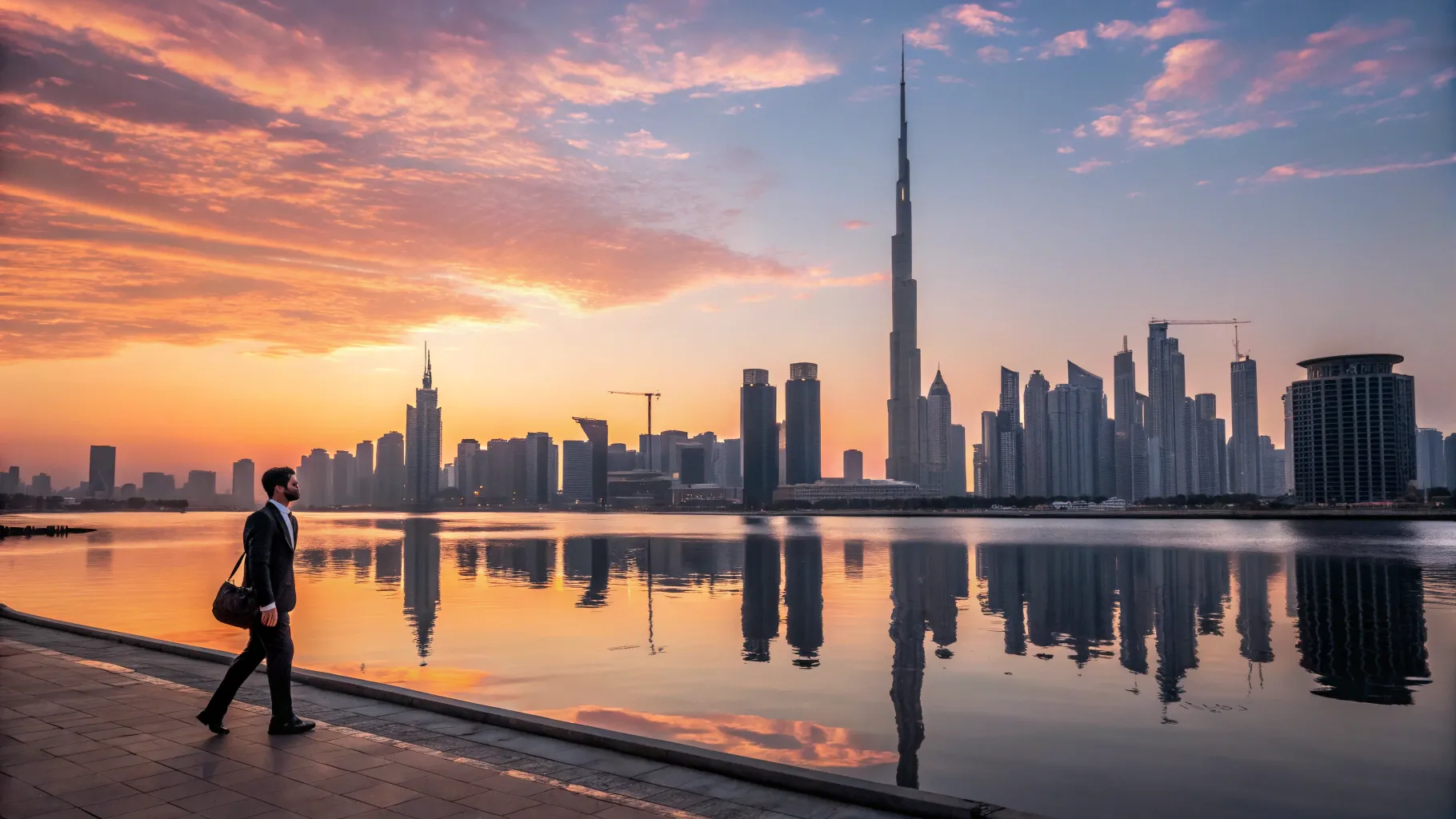- Blog
- moving to dubai from australia guide
Moving to Dubai from Australia: 2026 Relocation Guide

Discover everything about moving to Dubai from Australia in 2026. Learn about tax-free living, visas for Australians, school costs, and business setup tips.
Founder of JustMove
Summarize content with
Get AI-powered insights and summaries of this article
Just Move is the preferred partner of entrepreneurs
Expert in incorporation, accounting and immigration
Trusted by over 500+ entrepreneurs
4.9/5 reviews from our clients
100% satisfaction across all services
Content
- Why Moving to Dubai Matters: Benefits for Australians
- Navigating the 2026 Visa and Residency Framework
- Financial Systems: Currency, Banking, and Interest Rates
- Cost of Living: Dubai vs. Australia Comparison
- Healthcare and Education: Essentials for Families
- Step-by-Step Relocation Checklist: Your 90-Day Plan
- Frequently Asked Questions
- Start Your UAE Journey Today
The "Great Relocation" is officially in full swing as we move through 2026. A record number of ambitious entrepreneurs and skilled professionals are currently trading the Australian coast for the high-growth skyline of the UAE.
This moving to dubai from australia guide is specifically written for entrepreneurs, SMEs, and investors who recognize the immense potential of a city that now boasts a population of 3.638 million people. If you are looking to optimize your tax position or expand your market reach, this is your strategic roadmap.
We created this to inform and educate you through a comprehensive relocationguide, ensuring your transition is as seamless as the digital setup services offered by Just Move. You will learn the exact steps to navigate visa pathways, understand 2026 tax compliance, and manage the logistics of relocating to dubai from australia.
While the prospect of relocation is exciting, moving from australia to uae requires meticulous planning across visas, banking, and lifestyle adjustments. Moving from australia involves balancing complex legal paperwork with these lifestyle changes to ensure a successful landing in the Emirates.
By bridging the gap between your current operations and your future in the Middle East, you can leverage a business-friendly environment built for global success. The journey begins with understanding the essential regulatory frameworks and logistical steps that define this world-class city.
Why Moving to Dubai Matters: Benefits for Australians
For many entrepreneurs, this moving to dubai from australia guide serves as a roadmap to a more profitable and streamlined future. This 2026 edition of our relocation insights is written to educate and inform those looking to move from australia to uae. The shift is driven by a desire for a pro-business environment that rewards innovation without the heavy burden of domestic taxation.
Tax Benefits for Moving from Australia
The financial incentives for relocating to dubai from australia are unmatched by almost any other global hub. The UAE has a 0% personal income tax, 0% on income generated outside of the UAE, and 0% corporate income tax for many qualifying entities. These savings allow business owners to reinvest capital directly into their growth strategies rather than losing a significant portion of their margin.
Dubai has no personal income tax, which can significantly offset living costs for those earning a competitive salary compared to the high tax brackets found back home. While the UAE has introduced a 9% corporate tax on profits above 375,000 AED, Just Move assists SMEs in utilizing Small Business Relief (SBR). For a more in-depth understanding of the tax landscape, consult our Corporate Tax Guide UAE. This allows for 0% tax on profits if annual revenue remains below 3,000,000 AED through the end of 2026.
The Australian Community and Lifestyle
Concerns about social integration often vanish upon arrival, as Dubai is home to over 20,000 Australian expats. This established community makes the australia to uae relocation feel like moving to a globalized version of home, complete with familiar networking groups. The city offers a high standard of living that appeals to both solo entrepreneurs and those moving with families.
Managing an australia uae relocation involves entering a market where a majority of the population is expatriate, creating a diverse and inclusive business culture. This environment fosters rapid professional development and offers world-class amenities.
Professional Opportunity: Access to high-growth markets across the Middle East and Africa. Safety and Security: Benefit from one of the safest urban environments in the world. Digital Governance: Enjoy 100% online business registration and management through platforms like Just Move.
Success in this new market requires more than just a flight ticket; it demands a clear understanding of the legal pathways and company structures available to you. For a comprehensive overview, and to get started, launch your business in Dubai with our all-inclusive service.
Navigating the 2026 Visa and Residency Framework
As you embark on your journey using this moving to dubai from australia guide, the first hurdle to clear is understanding the visa landscape of 2026. Fortunately, the UAE has streamlined entry for Australian nationals, making the initial phase of your relocation remarkably efficient.
The Initial Entry for Moving from Australia
Australians travelling to Dubai can obtain a 30-day tourist visa on arrival, which is free of charge and can often be extended. This allows entrepreneurs to scout locations or meet the Just Move team in person before committing to a specific corporate structure.
Long-Term Residency Pathways for an Australia UAE Relocation
Expats require a residence visa to live and work in the UAE, which is typically sponsored by an employer. For most Australian nationals, visa processing for moving to dubai averages 20-35 calendar days, though Just Move often accelerates this through digital processing.
Work Visa: A standard work visa in Dubai is typically valid for 2 years and applied for by the employer. This remains the most common route for SME employees and corporate staff relocating from Australia to uae.
Green Work Visa: The Green Work Visa in Dubai allows self-sponsorship for up to 5 years and is aimed at freelancers and highly skilled workers. This is an ideal edition for those who want independence from a traditional employer-led sponsorship model.
Strategic Visa Options in This Moving to Dubai from Australia Guide
Understanding your residency status is vital to inform your long-term business strategy. Just Move helps you choose the right path to educate your team on compliance while ensuring your moving from australia to uae transition remains seamless.
Step 1: Secure your entry permit through our digital platform to begin the formal residency process. Step 2: Complete the medical check and biometrics once you arrive in the city for your one-week visit. Step 3: Receive your Emirates ID, which acts as the foundation for your banking and housing needs.
The 2026 framework emphasizes flexibility for those relocating to dubai from australia. By choosing a Free Zone setup with Just Move, you can often secure a residency visa that allows for 100% foreign ownership of your enterprise.
Managing these timelines is crucial when planning your notice period or property exit in Australia. Once the residency visa is stamped, you gain access to the full suite of UAE benefits, including the ability to sponsor family members and open personal bank accounts.
While the visa provides the legal right to reside, the financial efficiency of your move depends heavily on how you structure the underlying business entity.
Financial Systems: Currency, Banking, and Interest Rates
Navigating a new financial ecosystem is a critical step for any entrepreneur relocating to the UAE. This 2026 edition of our moving to dubai from australia guide aims to inform you about the unique mechanics of the local economy. Unlike the floating Australian Dollar, the UAE's currency, the Dirham (AED), is pegged to the US dollar at a rate of 3.6725 AED per 1 USD. This stability is a cornerstone of the UAE's pro-business environment, offering a predictable framework for international trade.
Interest Rates for Your Moving from Australia to UAE Transition
The financial link to the US has direct implications for your borrowing costs and corporate savings. Because of the currency peg, the UAE Central Bank cannot maintain an independent monetary policy due to the US dollar peg, forcing local interest rates to follow US rates. This differs significantly from the Reserve Bank of Australia's approach, where rates are set based on domestic data like local inflation and employment.
For those moving from australia, this means your purchasing power in Dubai is heavily dictated by global trends. The AUD/AED exchange rate is primarily influenced by the monetary policy and interest rate differentials between the United States and Australia. When the US Federal Reserve adjusts rates, the UAE typically follows suit, which can create a divergence from the financial cycles you are used to in Sydney or Melbourne.
Business Banking and Australia UAE Relocation
Setting up local banking is a priority for any entrepreneur. Just Move provides comprehensive banking assistance to simplify this process, offering guidance on how to open a bank account in Dubai, ensuring your company formation is backed by a robust corporate account. To educate yourself on the best options for your australia to uae relocation, consider the following 2026 requirements:
- Mandatory Documentation: You must provide a utility bill or bank statement as proof of address under current compliance rules.
- Digital Integration: Ensure your bank supports the new electronic invoicing system rolling out in July 2026 for B2B transactions.
- Currency Accounts: Multi-currency accounts are vital for startups that handle relocating to dubai from australia while managing revenue in AUD or USD.
Understanding these fiscal nuances ensures that your capital remains protected as you transition into this high-growth market. Beyond the bank account, the long-term success of your venture depends on choosing a legal framework that aligns with your specific industry goals.
Cost of Living: Dubai vs. Australia Comparison
One of the primary concerns for those relocating to Dubai from Australia is the shift in daily expenses. While the UAE is often perceived as a luxury playground, the reality for entrepreneurs is more nuanced. This 2026 edition of our relocationguide is designed to inform you about the practicalities of your monthly budget. For a detailed breakdown, refer to our comprehensive Cost of Living Dubai guide.
Using This Moving to Dubai from Australia Guide for Budgeting
The linguistic transition is surprisingly smooth for Australians moving from Australia to UAE. The official language of Dubai is Arabic, but English is widely spoken by 85% of the population. This dominance of English makes it the primary language for business, signage, and social interaction, significantly reducing the friction usually expected when moving from Australia.
Housing Costs: Dubai CBD vs. Australian Cities
When comparing property markets for your australia to uae relocation, your biggest expense will likely be accommodation. The cost of living in Dubai is high, with a one-bedroom apartment in the CBD costing approximately AUD$3320 per month in rent. This is comparable to, or slightly higher than, premium districts in Sydney or Melbourne.
However, your australia uae relocation plan should account for the different value propositions. While rent is substantial, several other factors balance the ledger:
- Fuel and Transport: Petrol prices remain significantly lower than in Australia, and the Dubai Metro provides an affordable, world-class alternative.
- Service Accessibility: Services like car maintenance and household help are often more affordable than their Australian equivalents.
- Tax Efficiency: The 0% personal income tax rate effectively increases your net purchasing power.
Economic Trends in 2026
Despite higher costs in education and rent, the overall cost of living in the UAE is trending lower than in Australia. This shift is largely driven by the rising cost of utilities and groceries back home. Entrepreneurs relocating to Dubai from Australia often find that their business profits go much further when managed through a tax-efficient structure.
Just Move ensures that your initial setup is lean, allowing you to allocate more capital toward your lifestyle or business expansion. Success in this new market requires more than just a healthy budget; it necessitates a firm grasp on the regulatory landscape that governs your new professional life.
Healthcare and Education: Essentials for Families
For families following this moving to dubai from australia guide, securing high-quality social services is a top priority. Moving from australia involves shifting from a public-centric model to a robust private system. This 2026 edition of our guide seeks to inform you on how to navigate these essential pillars of family life.
In Dubai, private healthcare is the standard for expats and mandatory health insurance is required for all residents. This system works by requiring every visa holder to have a minimum level of coverage. If moving to Dubai for employment, employers are legally required to provide private health insurance for their employees.
As an entrepreneur relocating to dubai from australia, you must ensure your business setup includes these provisions for yourself and your staff. Just Move assists startups in understanding these mandatory costs during the initial consultation. Ensuring your team is covered is a vital part of your australia uae relocation strategy.
Planning your australia to uae relocation for schooling
Education is often the largest recurring expense for families moving from australia to uae. Current data shows that sending a child to school from primary school to university in the UAE costs approximately Dh365,025 (A$135,195). This is significantly more than the average total cost in Australia, which sits around A$49,440.
Despite the high total investment across two decades, annual education costs in Dubai are lower than in Sydney. International and private primary school fees in Dubai average AUD$18,855 per year. In comparison, elite Sydney schools average AUD$27,359 per year, offering some immediate cash-flow relief to those moving to dubai.
Selecting the right curriculum is essential when moving from australia, as Dubai offers British, American, and IB options. This 2026 relocationguide helps you educate yourself on the best schools to align your children's future with your professional goals. This knowledge is crucial for a successful australia to uae relocation.
With family essentials secured, your focus must naturally shift to the specific legalities and logistical steps of your residency status.
Step-by-Step Relocation Checklist: Your 90-Day Plan
Executing the 90-day plan ensures a seamless transition when using a comprehensive moving to dubai from australia guide. This timeline helps you manage logistical hurdles while maintaining your business operations without interruption. Using this specific guide ensures that every legal requirement is met before you depart your home country.
Phase 1: Preparation and Strategy (Days 1–30)
Step 1: Gather all essential paperwork, including a recent bank statement or utility bill for proof of address, which is now mandatory for UAE setups in 2026.
Step 2: Consult the Australian Expat Relocation Guide Dubai Edition, which covers topics such as property rental, the Dubai rules, medical system, transportation, visa system, schools, taxes, banking, and leisure activities. These tools provide the necessary majority of information to inform your initial strategy for moving from australia to uae.
Phase 2: Licensing and Your Relocating to Dubai from Australia Guide (Days 31–60)
Step 3: Finalize your company formation. Whether you choose a Free Zone for 100% foreign ownership or a Mainland setup, Just Move secures licenses in 1–5 business days. This phase specifically for business owners involves choosing between a 2-year license for a 15% discount or a 3-year license for a 20% discount.
Step 4: Finalize your relocationguide strategy by booking international logistics. Australia to uae relocation requires careful coordination of shipping and temporary housing to ensure you are ready for your physical move to dubai from australia.
Phase 3: Residency and Settling (Days 61–90)
Step 5: Complete your physical arrival. Just Move facilitates your residency visa, medical visit, biometrics, and Emirates ID in approximately one week.
Step 6: Elect for Small Business Relief if your annual revenue is under 3,000,000 AED to protect your 0% tax status before the scheduled December 2026 expiration.
The 90-day plan works by breaking down a complex international move into manageable weekly tasks. This structured approach helps you navigate the uae legal landscape and settle your family into the local community with confidence.
Understanding the timeline is only half the battle; ensuring your business remains compliant with the evolving financial regulations of the Emirates is equally vital for long-term growth.
Frequently Asked Questions
What is the 6-month rule in Dubai?
The 6-month rule in Dubai requires residence visa holders to enter the UAE at least once every 180 consecutive days to keep their visa active. Staying outside the country for longer than this period typically results in the automatic cancellation of your residency. However, this rule often does not apply to Golden Visa holders or certain investors who maintain valid business interests within the Emirates.
What salary is needed to live comfortably in Dubai?
A comfortable lifestyle in Dubai for a single professional in 2026 typically requires a monthly salary between 20,000 AED and 25,000 AED. This amount covers high-quality housing, comprehensive health insurance, transportation, and regular leisure activities. For those managing an australia uae relocation with a family, costs will increase significantly due to private school fees and larger residential requirements.
Can I move to Dubai from Australia without a job?
You can move to Dubai from Australia without a job by applying for an investor visa or a freelancer permit through a Free Zone. Just Move facilitates this process by helping entrepreneurs establish a company in as little as 1 to 5 business days, providing a legal pathway to residency. This moving to dubai from australia guide recommends this route for individuals who prefer to maintain full ownership of their business operations.
How does this moving to dubai from australia guide help with 2026 taxes?
This moving to dubai from australia guide helps you navigate the 9% corporate tax rate and the expiration of Small Business Relief on December 31, 2026. It is essential to inform yourself about the 3,000,000 AED revenue threshold for tax relief and the mandatory e-invoicing system starting in July 2026. We aim to educate business owners on these compliance milestones to ensure a smooth australia to uae relocation.
Can I move to Dubai from Australia?
Moving to Dubai from Australia is a straightforward process involving visa application, document attestation, and residency processing. Australians are increasingly relocating to dubai from australia to take advantage of the 0% personal income tax and the strategic location for global trade. This 2026 edition of our relocation guide simplifies the transition by providing a clear roadmap for moving from australia to uae.
Navigating these regulatory nuances is the final step in preparing for your physical move to the Emirates. Once these common hurdles are addressed, you can finalize the administrative details that ensure your long-term success in the Middle East.
Start Your UAE Journey Today
Transitioning your business involves more than just a flight. This moving to dubai from australia guide has highlighted the critical steps, from choosing between Free Zone and Mainland structures to understanding 2026 tax compliance like the E-invoicing rollout. Whether you are relocating to dubai from australia for the 0% personal income tax or to expand into new markets, preparation is key to a successful australia to uae relocation.
Just Move simplifies moving from australia. We handle company formation and visa processing in as little as one week. Our digital-first approach ensures that your australia uae relocation is efficient and compliant with the latest uae regulations. We aim to inform and educate every entrepreneur, ensuring you avoid common setup pitfalls.
As the majority of successful expats will attest, having a partner makes all the difference in an extensive relocationguide. Your moving to dubai journey should be a launchpad for growth. To ensure your moving from australia to uae transition aligns with your business goals, speak with a Just Move specialist for a personalized strategy, or simply start your company creation process online today.
Founder of JustMove
Kasia is a renowned expert in business setup and relocation services in Dubai. With a proven track record as a top-performing account executive at PayPal and co-founder of luxury concierge service Alotea, she brings a wealth of experience to her role at JustMOVE. Kasia's deep understanding of the UAE market, extensive international connections, and multilingual capabilities (English, Polish, Russian, and French) make her an authority in navigating the complexities of business setup and relocation. Through the JustMOVE blog, Kasia shares her insights and practical advice to help entrepreneurs and families establish and grow their presence in the UAE. Her commitment to delivering personalized, transparent, and efficient solutions has earned her the trust of countless clients.
Check out more related articles

By Kasia

By Kasia
![Moving to Dubai from the US: Your Complete Guide [2025]](https://media.justmovedubai.com/Moving to Dubai from the US Your Complete Guide [2025].webp)
By Kasia

By Kasia

By Kasia

By Kasia